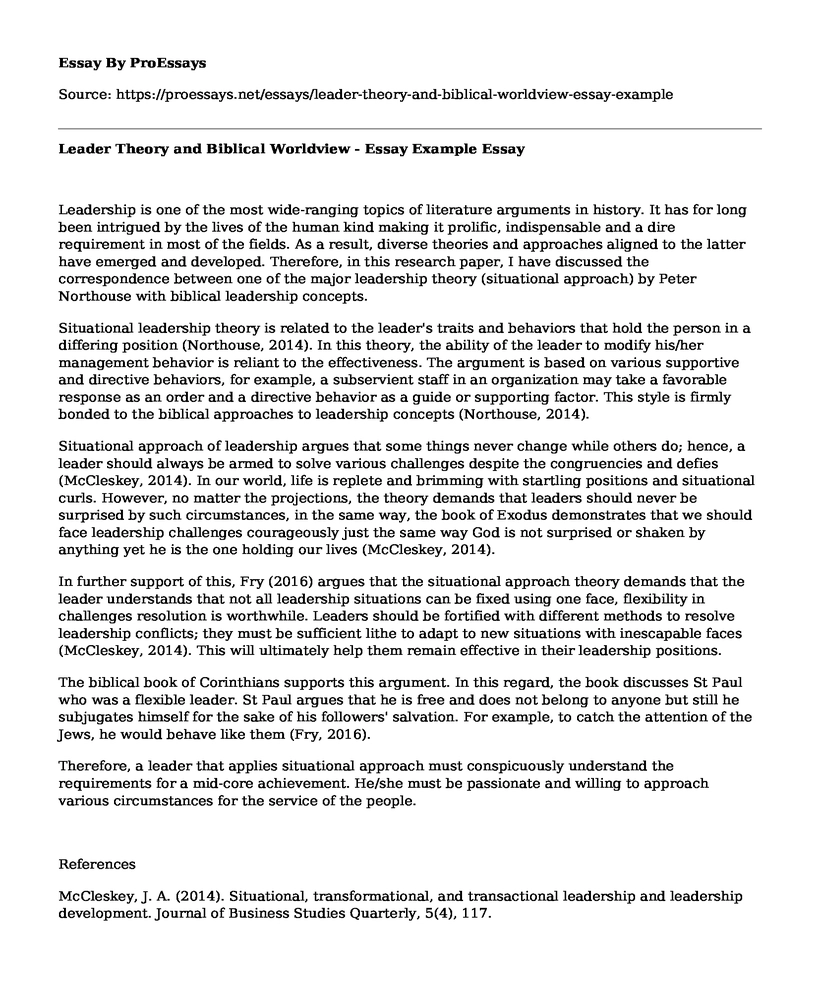Leadership is one of the most wide-ranging topics of literature arguments in history. It has for long been intrigued by the lives of the human kind making it prolific, indispensable and a dire requirement in most of the fields. As a result, diverse theories and approaches aligned to the latter have emerged and developed. Therefore, in this research paper, I have discussed the correspondence between one of the major leadership theory (situational approach) by Peter Northouse with biblical leadership concepts.
Situational leadership theory is related to the leader's traits and behaviors that hold the person in a differing position (Northouse, 2014). In this theory, the ability of the leader to modify his/her management behavior is reliant to the effectiveness. The argument is based on various supportive and directive behaviors, for example, a subservient staff in an organization may take a favorable response as an order and a directive behavior as a guide or supporting factor. This style is firmly bonded to the biblical approaches to leadership concepts (Northouse, 2014).
Situational approach of leadership argues that some things never change while others do; hence, a leader should always be armed to solve various challenges despite the congruencies and defies (McCleskey, 2014). In our world, life is replete and brimming with startling positions and situational curls. However, no matter the projections, the theory demands that leaders should never be surprised by such circumstances, in the same way, the book of Exodus demonstrates that we should face leadership challenges courageously just the same way God is not surprised or shaken by anything yet he is the one holding our lives (McCleskey, 2014).
In further support of this, Fry (2016) argues that the situational approach theory demands that the leader understands that not all leadership situations can be fixed using one face, flexibility in challenges resolution is worthwhile. Leaders should be fortified with different methods to resolve leadership conflicts; they must be sufficient lithe to adapt to new situations with inescapable faces (McCleskey, 2014). This will ultimately help them remain effective in their leadership positions.
The biblical book of Corinthians supports this argument. In this regard, the book discusses St Paul who was a flexible leader. St Paul argues that he is free and does not belong to anyone but still he subjugates himself for the sake of his followers' salvation. For example, to catch the attention of the Jews, he would behave like them (Fry, 2016).
Therefore, a leader that applies situational approach must conspicuously understand the requirements for a mid-core achievement. He/she must be passionate and willing to approach various circumstances for the service of the people.
References
McCleskey, J. A. (2014). Situational, transformational, and transactional leadership and leadership development. Journal of Business Studies Quarterly, 5(4), 117.
Northouse, P. G. (2014). Introduction to leadership: Concepts and practice. Sage Publications.
Fry, L. W. (2016). Spiritual Leadership.
Cite this page
Leader Theory and Biblical Worldview - Essay Example. (2021, Jun 28). Retrieved from https://proessays.net/essays/leader-theory-and-biblical-worldview-essay-example
If you are the original author of this essay and no longer wish to have it published on the ProEssays website, please click below to request its removal:
- Coach Bob's Coaching Philosophy and Style Paper Example
- Paper Example on The Impact of Computer Workstations on Performance
- Essay Example on Creating the Right Environment for a Successful Meeting
- Essay Sample on Leaders: God-Gifted to Transform & Guide the World
- Essay Example on Sustainable Development in UAE: Past to Present
- Teamwork Therapy: Effectiveness for ASD, ADHD, & Anxiety - Essay Sample
- Essay Example on Jews & Christians: A New Dialogue







